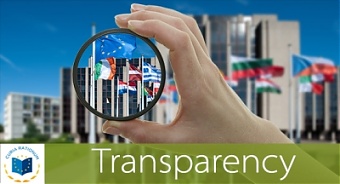Analytics, Direct Speech, EU – Baltic States, Financial Services, Legislation, Taxation
International Internet Magazine. Baltic States news & analytics
Wednesday, 24.04.2024, 17:03
Spending EU taxpayers´ money must bring better results
 Print version
Print version |
|---|
In other words, the EU must invest
its money better. In the aftermath of the Brexit vote as the Citizens’ trust to
EU was very low, we highlighted that there should be reform which must be built
on solid financial foundations. In our view, four elements were of particular
importance.
First, the EU must keep good
accounts. People cannot even begin to trust the Union if they do not believe
that their money is properly looked after and accounted. Secondly, the EU must
make sure its financial rules are correctly applied. Thirdly, EU spending must
bring value-for-money; and fourthly the spending has to be open and
transparent. Each of these elements still requires significant efforts. Some
improvements surely have taken place but the glass is still - at best - only
half full. In our annual report 2016, we concluded that about half of EU
spending was below the 2% threshold for material level of error. As a result,
we issued a qualified opinion on 2016 payments, rather than an adverse one.
This was our first qualified opinion since we began to provide an annual
statement of assurance in 1994. In addition, we could give a clean opinion on
the 2016 EU accounts’ reliability, as has been the case every year since 2007.
But despite improvements, the overall level of error for EU spending in 2016
was still at 3.1%, clearly above the material threshold of 2 %.
When presenting the annual report
2016 our President Klaus Heiner Lehne
stated that “This year’s qualified opinion reflects an important improvement in
EU finances … Going forward, we will take greater account of internal controls
at the European Commission and in the Member States, so we can better promote
accountability and further improve the management of EU finances. We will also
increase our focus on performance to ensure EU citizens get value for their
money.” So, in the years to come our work will put greater emphasis on
verifying the audit results reported by the Commission, our main auditee. In
addition, we will continue to devote more resources to performance related
issues, to be published together with the annual report or in separate special
reports. EU´s annual budget has been framed, and since 2014 regulated, by so
called multiannual financial framework. The seven year framework, essentially
expenditure ceilings, sets out how much and in which policy areas EU can spend
taxpayers´ money. Commission´s proposal for the next framework is planned to be
published in May 2018.
Our annual report 2016 (published in
September 2017) was thus the last one before the next round of intense and long
discussions will kick off. As said before, even if there have been improvements
in the management of EU budget, there is still plenty of opportunities to make
the future EU budgets much more results-oriented and concentrate more on
projects bringing real European added value. It is of course important for our
citizens to know that public funds are being spent lawfully. But even more
importantly, people want to know what they got for their money. Did it make
sense to build a particular road or airport in a particular place? Were jobs
and growth actually delivered? Was this programme or project really worth
funding from the EU budget instead of national budget? Aiming at better value
for money includes all the EU policies, not least the cohesion policy. Therein,
the first question is, should the wealthier member states still implement their
development projects with EU co-financing? Some people have also asked whether
the traditional grant type financing is the most appropriate taking into
account ownership of the projects? Or in the world of ultra-low interest rates,
should the focus be more on loans and guarantee type of support? And finally,
should the allocation of EU funds under cohesion policy be made more
conditional on performance? These questions – made by some prominent experts –
will certainly pop up in the discussions on the future financial framework.
As I mentioned in the beginning, the
absorption of EU funds, especially in the area of cohesion policy, has been the
main driver in the philosophy of the member states, and the Commission. The
national envelopes, handed over to each member state for the 7 year period,
have been ring-fenced and the only threat of losing even small part of them has
been the inability to use them in 2 or 3 years. There are signs that some
member states have had genuine problems to find useful projects to be financed
from their envelopes. One sign is that the total payments the EU is committed
to making from future budgets (outstanding commitments) were higher than ever
in 2016, at €238.8 billion. The European Court of Auditors will continue to act
as the guardians of the EU’s finances and of our citizens’ financial interests.
We will continue to be an independent voice, highlighting things that work well
and shining a light on uncomfortable truths when things are not working. And in
a world of widespread misinformation and manipulation of data, the European
Court of Auditors will continue to provide EU citizens with reliable and
unbiased information.








 «The Baltic Course» Is Sold and Stays in Business!
«The Baltic Course» Is Sold and Stays in Business!

